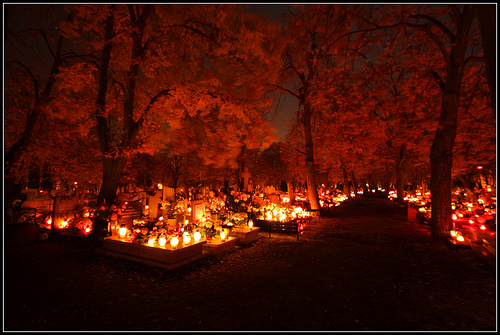Our church, like many churches, celebrates All Saint’s Day on the Sunday after Halloween, and so that is what we did last Sunday. The church I used to attend doesn’t practice a strong liturgical calendar, and, although I understand why, I also find power and meaning in the wheel of the year. I like that the common liturgy means that many of my friends, attending different churches of different denominations in many places around the world, begin their week with meditation on the same piece of scripture that I did.
And my first introduction to the value of this calendar came the first time I visited the church where I now have a home. That day, seven years ago, was All Saint’s Day.
When the worship leader opened by noting that it was All Saint’s Day, I raised an eyebrow. I was visiting a Mennonite church. They’ve made a whole religion out of not being Catholic (or even Catholic-lite), so what were they doing celebrating All Saint’s Day? My one association with the holiday was the time when everyone in my fifth grade class at St. Mary’s was upset because the class heathen (me!) got to play Saint Bernadette in the All Saint’s Day pageant.
It turns out that some Mennonite congregations, and apparently many Protestants, devote this Sunday to remembering loved ones who have died. That first Sunday at my church, a woman told the story of her child who had been stillborn a few years earlier, and I cried with sadness for her loss, and for all grieving parents. A man spoke about his father who had passed not so long before, and his story made me cry with laughter. Someone else told about a family member who had died decades earlier, and about the events in the intervening years where his absence was as big as anyone’s presence.
This was a timely service for me. On October 30 of that year, only days before that first Sunday, my much-loved childhood violin teacher had passed away. I hadn’t seen her in years, although we had kept in touch off and on. No one in my new community knew her. I didn’t have anyone to talk with about her. I felt awkward about mourning her. She hadn’t been in my daily life since I was in middle school. And yet, I felt her loss keenly. The world couldn’t possibly be as good without her presence in it. Although I play the violin only rarely these days, I know that her kindness and patience taught me about so much more than fingers and horsehair and wood.
Such a blessing it was, then, to find myself in a community of mourners, on a day when I was mourning. I lit a candle. I murmured her name. I was comforted.
I recently was discussing this holiday with a dear friend who has suffered more than her share of losses. She feels like people expect her to be “over it.” I think she’s probably wrong about what people are thinking, and I told her as much, but I found myself also wishing that her church offered this annual remembrance. We acknowledge and remember all grief, and bless it, and pray over it. We may not be out partying at gravesites (Mennonites are usually a bit quieter than that), but this Sunday, the dead do feel more present. As another friend said, “They’re still part of your community. They’re just dead. That’s what it means to have a cloud of witness.”
Last Sunday, when it was time to light candles, nearly everyone got up and lit one and prayed. I saw people who I knew had suffered very recent losses crying as they held their candle to the flame. I saw others who had been widowed for many years add their candles to the assembly. There wasn’t any judgement of how terrible one’s loss was–no one saying that a parent’s passing trumped a friend or a coworker or someone you just saw at the coffee shop. No one judged time, either. The whole community shared and accepted everyone’s grief. So many candles reminded me that everyone has lost someone. Nearly everyone has a kernel of grief lingering in their heart. Surely, they know you don’t just “get over it,” because they themselves are not over it.
Grief doesn’t go away. It just gets weirder and less predictable. Because the dead are still with us–in the things they taught us, in the jokes we shared. I see my grandpa in the way Petra peers deeply into the eyes of any living creature. I hear my old violin teacher in the words I use to tell Silas when he’s out of line, on a day when I’m feeling uncommonly forgiving. Some days, I just know that someone I’ve lost isn’t so far away. A few weeks ago, a scattering of pine needles on a path shocked me back to the last happy days I spent in the woods with a college friend who committed suicide only months later. When I kicked the thermostat on for the first time this winter, I chuckled at the many stories of my grandpa’s parsimony with the house heat.
I am thankful for my cloud of witness. And I am thankful for a faith community that makes space for our grief as well as our joy.

Beautifully written!